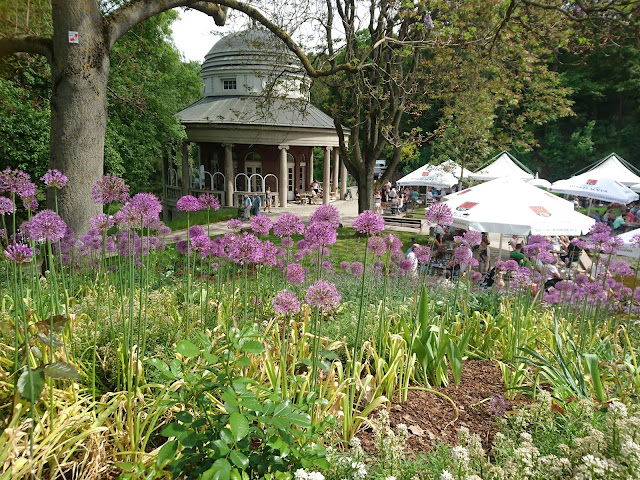"Abu Wad's whole existence seems dedicated to the beauty of life"
About the time my first son was born I used to look for quiet streets in Southwark to take him out for walks. Invariably, on the way to or from walks along the South Bank we would go along the unpromising Redcross Way in the middle of which was a small haven of peace and green and growth. This garden was founded in 1887 and almost lost during the twentieth century until it was rescued and revived the year before my son was born. A garden relies on insight and creativity, love, nurturing and persistence and often help from like-minded friends. Well over one hundred years later, though small, it is still giving sanctuary and pleasure to people every day. It was at this time I first thought what a special legacy a garden is.
Nearby, there used to be a mysterious locked gate with things tied to it. Behind I remember nothing but wasteland, like a building site but there must have been a sign somewhere because I knew centuries ago it had been a burial site. I wonder if the guerilla gardener who planted here was inspired by the Red Cross Gardens because now I see Crosssbones has become a garden itself.

This is another community garden made by volunteers in Dunkeld, near me. I recommend the village also for the views of the river, the cathedral, and especially the surrounding walks.
All gardens are restful and re-energising, even - sometimes especially - those in the centre of a city. And yet gardens, living testaments to creativity and care exist in such variety. These are just a few of those I have seen this year, often with my children.
 |
| Centre of the maze, Falkland Palace, Perthshire |
 |
| Beech maze, Scone Palace |
 |
| Drum castle, Aberdenshire, which has quadrants of historic roses |
 |
| Gardens recommended to me between Jujuy and Independencia, Buenos Aires |
 |
| Wildflowers planted on a verge opposite some houses, Auchteragven |
 |
| Willow room and tunnel, New Lanark |
 |
| Teehaus in Weissenburgpark |
This short film about the last gardener in Aleppo, contains so much. Many will, like me, find it distressing but it is also about an inspirational man who, like many gardeners seems to have improvised with what was to hand and turned all circumstances to his advantage. He had faith in life and beauty and saw new life growing even as his garden was damaged by war. He saw a way forward, a meaning and purpose in the most chaotic, dangerous and difficult conditions. I listen to his words: "music", ordinary people, help, beauty, nourishment, life. You can tell so much about someone just from the words they use. Despite his death and the obvious personal tragedy for his son, he lives on and in the best way.
For me so much of value in life and the things that help us decide how to live is found during time spent in gardens but also in stories shared and in conversation. Although his circumstances were so different to mine and although he speaks for only a few moments in that short time I learn so much about beauty, hope, love, wisdom, courage and great strength of character.
And also, that if you make the right conditions and if you believe that it is possible, not only can beautiful things can grow in the most unpromising places where others would never believe it is possible but when people see what is possible some of them go on to plant too. Because while a plant growing is miracle enough, what is planted is never only a plant.
Tonight my son asked for a second story. It was late and I said one was enough but he begged. And time with our children is so short, especially time of this sort and you never know for how long you can enjoy such grace and good fortune, so how can you refuse? He brought this:
It is the tale of a thief who does not initially realise what she has stolen. But, on opening the bag of acorns realises there is a forest in her arms. She becomes someone who transforms grim roundabouts and dark cities.

And I think this story is about the change within ourselves, which can be an awakening or a struggle, when we realise things about which we may have been unaware or mistaken. It is about when we understand where value lies and we continue to pass on what we have learned - quietly, by planting and letting things grow.





